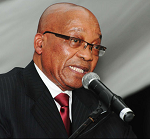The fifth general election in South Africa was far from mundane. It was underlined by the significance of the country’s 20th anniversary of its political transition to a democratic dispensation. In many ways several major factors and issues underscored the pre-election period.
The first issue was that this was the first time that the generation born after Mandela took office – the “born frees” – voted, seemingly free of the political baggage of the past. Much of the attention was focused on what will influence the attitudes of this cross-section of the population who are often referred to as Mandela’s generation.
The second and more important factor was that this marked the first real test of President Zuma’s five years in power which was clouded by controversies over corruption scandals, irregular procurement of state resources and four cabinet reshuffles.
The third issue, while linked to the latter point, was related to Mandela’s legacy, which the ruling African National Congress party (ANC) sought to invoke, in what some commentators interpreted, as a sympathy vote following the passing away of the statesman last year.
Fourth was the pragmatic question of whether the opposition would be able to consolidate their electoral footprint. The official opposition party, the Democratic Alliance (DA), had pulled out all the stops to garner significant support, mainly among the black, middle class voters. For other smaller parties, the critical issue was whether they could sustain their relevance. This was definitely aligned to the final issue, which saw the emergence of two new parties, namely Agang SA and the Economic Freedom Fighters (EFF). While the phenomenon of new parties emerging on the eve of elections is not new, the circumstances that led to their formation made the electoral landscape more intriguing.
Formed ten months prior to the election, the EFF is led by the former ANC youth league leader, Julius Malema. Ousted for bringing the ruling party into disrepute, Malema effectively played on the sentiments of the disaffected voter who felt economically vulnerable and marginalised from state benefits. Unfortunately for Agang SA, which was formed in early 2013, the razzmatazz of its presence soon dissolved into a spiral of poor timing, internal strife, and a botched merger with the DA.
The Independent Electoral Commission (IEC) had three registration periods that saw a total of 25,381,293 South Africans registering. Of this 18,402,497 votes were cast, constituting a turnout of 73.43% – higher than in previous years.
There was never any doubt that the ANC would come back to power. The more pertinent question was the final percentage of votes it would garner. Speculation was rife that the ANC may even dip below the 60% mark. In the months leading to the election the ANC had lost its hold among sections of the youth and lower working class groups. Moreover, there were attempts to consolidate the party’s footprint in the economic heartland of Gauteng, a hotly contested province where the DA spent R100 million to secure a victory. The official results saw the ANC win by 62.15%, demonstrating a significant fall from the 2009 election where it registered 65.9%.
The DA broke the 4 million mark, increasing the levels of voter support to 22.23% from 16.66% in 2009. It continues to control the Western Cape, significantly improving its performance from 51% in 2009 to 59.38%. The ANC, on the other hand, managed a mere 1.4% rise. The DA made substantial gains in Gauteng as well, registering a 9% increase. Here the ANC recorded its largest loss in voter support – over 10%. This has raised questions of whether the ANC has paid the price for policies like the controversial e-tolls, notwithstanding social service delivery protests and anger over the use of state funds for upgrading President Zuma’s homestead in Nkandla.
The biggest winner was the EFF, which despite its often unrealistic promises, succeeded in securing 6.35% of the vote. This can be interpreted as a ‘protest vote’ against the ANC, especially by lower working class constituencies who wanted to demonstrate their frustrations.
Of the total 29 parties that contested these elections, only 13 have made it to the National Parliament. The challenge for the smaller parties is to establish their relevance amongst a discerning electorate. For all political parties the lesson learnt from this election is to not underestimate the electorate. The message has gone home that voters will use their vote to demonstrate their frustrations against inefficiencies, poor governance and unkept promises.
Sanusha Naidu is a research associate in the Department of Political Science, University of Pretoria, South Africa. She was an accredited political analyst for the elections.
This article was exclusively written for Gateway House: Indian Council on Global Relations. You can read more exclusive content here.
For interview requests with the author, or for permission to republish, please contact outreach@gatewayhouse.in.
© Copyright 2014 Gateway House: Indian Council on Global Relations. All rights reserved. Any unauthorized copying or reproduction is strictly prohibited


